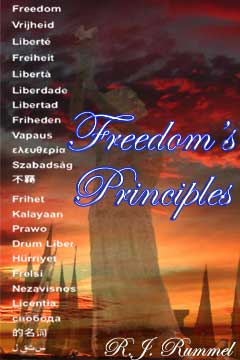
To characterize Obama’s foreign policy, I must first examine those Clinton and G. W. Bush policies which he has discarded. Obama’s policy is new and revolutionary in philosophy and in details, best seen in comparison and contrast to what has gone before.
The collapse of communism in Eastern Europe and the demise of the Soviet Union (1991) during President George H. W. Bush’s Administration, made obsolete our half century old grand strategy of Containment (containing communism in its present borders). But what was to replace it? G.H.W. Bush provided no clear answer. Rather than articulating a new grand strategy of foreign policy, he preferred to follow several foreign policy principles. These were the traditional ones of collective security and defense, multilateralism (working with our friends and allies to achieve a common goal), opposing aggression, and protecting global oil sources from monopolization by an aggressive dictator. All these were involved in the 1992 Gulf War—the American led effort to defeat Iraq's invasion and occupation of Kuwait and its oil fields. Another foreign policy principle was that of nonproliferation which, to this day, underlies American pressure on North Korea to open its nuclear facilities to international inspection.
But relevantly here, in the last years of this Bush Administration high officials were making comments clearly showing appreciation of the relationship between democracy, international cooperation, and peace. Promoting democracy was an operating principle. Thus, we saw a variety of American attempts to help democratization in Eastern Europe and especially, in reborn Russia as well as in Latin America. Bush clearly linked aid for Russia to democratic peace. Still, while fundamentally realist in policy, this Bush Administration articulated no overall strategy within which these ideas had more than an ad hoc life. Perhaps it is unfair to demand one, for this, after all, was the Administration that saw and was partially responsible for negotiating the end of the Cold War. Clearly, however, they were moving toward a general policy of democratic peace, and might have articulated one if they had won a second term. But it was left to Bush’s successor, President William Clinton, to finally conceptualize such a policy.
From day one, the Clinton Administration had a firm overall foreign policy goal of democratization—to help other nations become democratic and to help solidify the newly democratic ones. The reason was a belief in the democratic peace. Clinton himself was aware that democracies do not make war on each other. In one of his speeches during the 1992 election campaign he said, “Democratic countries do not go to war with one another. They don't sponsor terrorism or threaten one another with weapons of mass destruction.” As President he expanded on this, as in his 1994 address to the UN General Assembly, "Democracies, after all, are more likely to be stable, less likely to wage war. They strengthen civil society. They can provide people with the economic and political opportunities to build their futures in their own homes, not to flee their borders." The foreign policy consequence of this view was made plain in his 1994 State of the Union address: "the best strategy to ensure our security and to build a durable peace is to support the advance of democracy elsewhere." It was the democratic peace.
This idea was a foreign policy principle shared by virtually all top officials in his administration. In foreign policy speech after speech, the basic understanding that democracies do not make war on each other was reiterated and the cooperative nature of democracies underlined. From this belief flowed a doctrine of democratization, called a guiding concept of (democratic) enlargement.
Moreover, this overall foreign policy goal was being implemented through a variety of organizations, many of which were specifically created during the Cold War to further democracy and some of which have changed their fundamental policies to put democratization front and center. Such have been the Agency for International Development (AID), the US Information Agency, the International Republican Institute, the National Democratic Institute of International Affairs, the Center for International Private Enterprise, and the Free Trade Union Institute.
To foster democracy, such agencies and organizations provided economic aid, helped to establish sound constitutions and the rule of law. They worked to improve civil-military relationships and especially the subordination of the military to elected civilian authorities; strengthen and democratize local governments, give decision and rule making and material aid (like computers) to elected legislatures. They furthered an independent and neutral judiciary and politically neutral police; improve the fairness, openness, credibility, and effectiveness of elections; and further civil and political rights and the rights of women and minorities, and much more.
As required by Section 603 of the Goldwater-Nichols Act of 1986, in July 1994 Clinton submitted his report elaborating A National Security Strategy of Engagement and Enlargement. This not only laid out his new national security strategy but also his foreign policy. In the signed preface the President defines the three goals of this strategy as
• To credibly sustain our security with military forces that are ready to fight.
• To bolster America's economic revitalization.
• To promote democracy abroad.
He believed
that our goals of enhancing our security, bolstering our economic prosperity, and promoting democracy are mutually supportive. Secure nations are more likely to support free trade and maintain democratic structures. Nations with growing economies and strong trade ties are more likely to feel secure and to work toward freedom. And democratic states are less likely to threaten our interests and more likely to cooperate with the U.S. to meet security threats and promote sustainable development.
So, Clinton’s foreign policy did not give up a basic concern for power and attention to diplomacy. It departed from realism in foreign policy in recognizing the importance of whether a nation’s regime is democratic. The democratic peace, although one of three goals, was a major guide to the Clinton foreign policy.















No comments:
Post a Comment